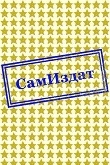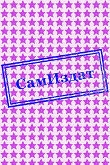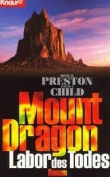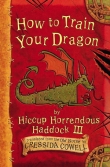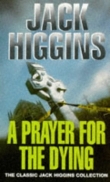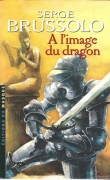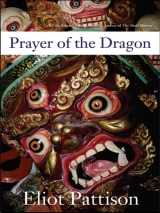
Текст книги "Prayer of the Dragon"
Автор книги: Eliot Pattison
Жанр:
Полицейские детективы
сообщить о нарушении
Текущая страница: 4 (всего у книги 24 страниц)
“But they had a machine gun,” Shan ventured.
Yangke nodded.
“How do I get there?”
“There is no way, not anymore. Maybe they saw me or some of the other herders. There was only one gap like a narrow gate in a high wall. Soldiers put bombs in the gap and brought the rocks down. The two sides of the mountain can no longer meet. They haven’t for years.”
Lokesh had wandered up the trail to the second set of rock outcroppings. As Shan watched, the old Tibetan tilted his head one way then another, then made a series of hand gestures, ritual mudras, beginning with his hands pressed together, pointing outward, the thumbs and forefingers folded inward. It was the sign for water for the face. He was making the mudras for what the devout called the Eight Outer Offerings.
As Shan approached he found his friend at a long, flat ledge, perhaps five feet high, leaning over a rust brown image. To his right was another image, the familiar tapered egg shape of the ritual treasure flask, often depicted in the hands of painted deities.
But Shan had never seen the image on the left before.
“It is lightning,” Lokesh said, “yet not.”
The zigzag line drawn in blood did indeed look like a thunderbolt. Except that at its top, at its thickest part, was a triangular head with two eyes. “Or a snake,” Shan ventured. “Except,” he added, pointing to the two pairs of bent lines near top and bottom, “what serpent has arms and legs?”
“A dragon,” Lokesh concluded in a tone of somber discovery. “A thunder dragon.” He had followed a particularly Tibetan logic. The mountain was famed for lightning. Lightning was born of thunder and, as the older Tibetans knew, thunder came from the throats of dragons. And here they were on the mountain called Sleeping Dragon. Shan found himself gazing toward the summit. More than a few Tibetans believed dragons existed, though, like lamas, they were not faring well in the modern world. Shan had accompanied Lokesh on a race through the mountains the year before after a report of a sighting of one of the sacred creatures.
Shan left his friend’s side to search the ground where the man who was either a saint or a murderer had been found, his fingers bloodstained, with a bloody hammer. He stepped over dried, curled leaves to take in the scene more completely, then walked back and forth. Here there were none of the broken stems he had found elsewhere, no sign that anyone had been dragged, but likewise no sign of the cleated boots the comatose man had been wearing. He examined the small cracks between rocks and the gaps between boulders for a hundred-foot radius, pausing at a flattened circle of earth that showed particles of colored sand. There had been a sandpainting, Yangke had said. From a shadowed crack halfway between the charnel ground and the place where the stranger had been found, he pulled a toothbrush, its bristles stained red-brown. So the saint had not painted the images with his fingertips. It seemed unlikely that he was the one who had painted them.
Something nudged his senses, and he paced along the wall again. The dried leaves caught in the grass. There were none anywhere else, only near the painted images of the flash and the dragon. He bent and gathered several, then sat and probed one. It was not a leaf, it was a flower, one of the dried trumpet flowers that bloomed on the slopes, though the nearest plants were some distance away on the far side of the stream.
“It was an altar,” Lokesh declared. He retrieved some of the flower heads closest to the rock and held them toward Shan. They too were stained with blood.
It took a moment for Shan to grasp his meaning. The body of the stranger had been arranged beneath the painted images, along with the flowers, a traditional altar offering. Or perhaps an atonement. But the bloody hammer did not fit. Had two different people played a part in the killings? The saint had been carried to his place beneath the altar, which would have required two men. One had been devout, in his own strange way. But the other-the cool, calculating one-had dropped the hammer there to implicate the stranger in two murders.
When they neared Drango village they found men with heavy staffs stationed at the outer edge of the fields. They did not greet Shan and Lokesh, did not even acknowledge them as they stepped onto the path that wound down through the barley fields to the village proper. Shan paused and gazed back up the mountain. What were the men watching for?
The young children in the village fled when they saw Shan and Lokesh. A woman churning butter leaped up and darted into her house, dragging her churn inside with her. A small white dog barked at them. Shan approached the stable and froze. The door guard was gone. But a bar had been placed across the door, locking any occupant inside. He lifted the bar and used it to wedge the door open. Inside, only a few pots of butter remained lit, enough to show the man lying exactly as Shan had last seen him. But he was alone. The villagers who had maintained a vigil were gone. Gendun was gone.
Lokesh and Shan exchanged alarmed glances. Lokesh approached the pallet and sank to the floor beside the comatose man. “Go,” he said to a Shan in a hollow, frightened voice. “Find him.”
Shan ran to the house they had slept in. They had never seen its owner, but the night before they had found blankets in the corner of the stable below the living quarters, on rough straw and canvas pallets. Their three pallets were now rolled up against the wall. A shadow moved at the top of the ladder leading to the second floor. When Shan followed, he saw the woman of the house standing at the only window, staring out through the battered pane of sooty, cracked glass.
“At times like this Gendun will forget to eat or drink unless we remind him,” he said to her back. “There are stories of lamas in meditation rising up as if sleepwalking and stepping off cliffs.”
The woman didn’t respond. Finally, she said, without turning, “When the wind blows just right, I can hear the whirling of the prayer wheels on the porch of the old temple.”
“If you are one of the few who can remember the temple perhaps you also remember compassion.” He could not understand the strange breed of people that inhabited Drango village. Why did these Tibetans, alone among all those he had encountered, make him feel so resentful? He recognized her as he came closer. She was the elder from the night before. Chodron had given a name to the widow who owned the house. Dolma.
“I need to talk to one of the men who found the bodies,” he said to her back.
When the widow did not reply he left her staring out the window and began to search the town, trotting up the street, then back, and around the houses on each side, pausing to gaze into the stone-fenced yards behind each. No one protested as he searched for Gendun but no one offered any help. Some yelled at him. One man threw a stone toward him. Most glanced at him and looked away, as if they might will him to leave.
After a fruitless search, he reached the rear door of Chodron’s house. He knocked, then tried the latch. The door opened and he found himself in the lower chamber, facing the Chinese flag. To the left was a heavy plank door, padlocked shut. To the right, the door to the rest of the house was also locked. Shan tapped, then pounded on it, calling first the name of the headman, then that of the lama. He paced around the entry chamber, pausing at a small table beneath the red flag. On it lay stacks of brochures. Scientific Principles of Village Management,one was captioned. The Power of Community Socialism, read another. They were all in Chinese, though he doubted more than a handful of the villagers read the language. Beside the brochures was a little copper bust of Mao Tse-tung. Chodron had an altar after all.
As he left the building he glimpsed a child, the girl who had brought food to Yangke, standing by the nearest stone granary, peering inside. When she discovered Shan at her side the girl gave a yelp of fear and scampered away.
“Gendun!” he cried as he opened the door wider. The lama sat in the middle of the stone floor, a solitary lamp flickering at his knee. His arms were bound behind him, wrapped around the heavy center post. He acknowledged Shan with a weak smile.
“What have they done?” Shan groaned. Across the lama’s cheek was a discolored line of little drops of dried blood. Across the back of his right hand was a similar mark. Gendun had been caned.
“He raised a hand and spoke words I could not understand,” the lama said hoarsely as Shan knelt behind him, untying the ropes.
“Did the man on the pallet strike you?”
Gendun cast a perplexed glance at Shan. It was as if he was unaware that he had been beaten. “His words had the sound of a prayer. I think he spoke one of the old tongues.” There were dialects in parts of Tibet that were nearly lost, that dated back to the centuries before history.
Shan’s heart leaped into his throat as he saw the bent fingers of Gendun’s left hand. They were twitching, curled like claws. “Noooo!” he gasped, and quickly pushed up the lama’s sleeve. A terrible dark panic swept over him as the saw the twin sets of bruises and burns. “Who did this? Why?”
“That one is confused about the way of things. He seemed to think he could inflict pain to show me a new truth.”
They were no longer talking of the man on the pallet. “Chodron? But why? What did he want?”
“He said I must tell the people the beetle had to be returned to the mountain deity.”
“What beetle?”
“A yellow beetle. I said it belongs to no deity I know. He laughed and had men put me in here, and they did those things to me. He said no food and water for a day and night would change my mind.” Gendun stood and stretched, rubbing his discolored wrists, staggered, then nodded vaguely. “The one in the stable is not ready to be alone,” the lama declared, and without another word he left the granary.
Shan quickly found what he was looking for, in a corner behind the door. His hand had closed around his own upper arm without his knowledge. That was where a similar device had been used on him years earlier. A heavy truck battery, with spring clamp cables. In the doorway Shan almost collided with the old widow. Dolma’s eyes welled with tears as she watched Gendun hobble toward the stable. Concealed by the blanket she had thrown over her shoulders was a small wooden pail, holding a jar of water and several cold dumplings. “Lha gyal lo,” she whispered to Gendun’s back.
“Why is Chodron so concerned about a yellow beetle?” Shan demanded.
“It wasn’t always like this,” Dolma said. “The Drango I grew up in would never have permitted harm to befall a lama.”
Shan realized he had asked the wrong question of the woman. “What happened to Drango?”
“What happened to Tibet?” the woman rejoined warily.
“Terrible things happened to Tibet,” Shan admitted. “But what happened here is different. The things done to Tibetans here are done by Tibetans.”
Dolma stepped inside the stone granary and set down her pail. She began smoothing the dirt around the center post, as if to eliminate all signs Gendun had been there. “It was done to save us,” she asserted. “We heard stories of villages that disappeared in clouds of smoke, or had their people relocated to cities. A village on the far side of the mountain was wiped away by big machines. In another village all the men and boys were lined up and shot because one had thrown a stone at a soldier. Our headman was very clever to have saved us.”
“Chodron?”
“His father.”
“How?”
“Gold.” The woman spoke with a strange mix of pride and melancholy. “Our gold has always been our great protector.”
The words hung in the air. It was like a village prayer. Drango sat on a gold mountain watched over by a golden deity. It had been preserved not because of the virtue of its inhabitants but, he was beginning to suspect, because of greed.
Shan found Gendun seated in the stable as if he had never left, his legs crossed under him, his eyes focused on the stranger’s face, his fingers on the prayer beads in his hand, Lokesh on the other side of the man. As Shan lowered himself to the floor beside Lokesh, he saw the discolored flesh on Gendun’s arm again. His mouth went dry. The wave of emotion that surged through him almost made him physically sick. He clamped his hands together, staring into them, forcing himself to focus, to find the calm within, as Gendun would want. Anything to keep his mind away from the catastrophe ahead.
Gendun did not seem to notice when Shan lifted the stranger’s wrist. The man’s pulse seemed stronger. Shan immersed his fingers in a bowl of water beside Lokesh, then held them over the man’s mouth, letting the water drop onto his open lips. The man’s tongue slowly reacted, seeking the liquid. Shan immersed his fingers again. He continued the process for some time, pausing when he caught himself staring at the marks on the lama’s arm.
A voice abruptly spoke behind him, “Yangke is being punished. You may not use him as your servant.”
“My servant?” Shan asked Chodron “You forced him to guide you to the scene of the crime.”
Shan faced the angry headman. “I envy Yangke. It must be a relief to know so exactly the dimension of one’s burdens.”
“You are closer to that luxury than you think, Prisoner Shan.” Two sturdy farmers stood in the shadows behind Chodron, one holding a length of rope similar to that which had bound Gendun.
“Have you ever visited a hard-labor prison camp?” Shan asked.
“I had the honor once of attending a camp for May Day events,” Chodron replied. “I remember a banner. KNEEL TO THE ALL-POWERFUL PARTY.”
“You date yourself,” Shan said, shuddering. He recalled sitting under such a banner, many years earlier, as one of the privileged guests watching a prison parade outside Beijing. “The verses are more subtle today. Think of advertising slogans for some global enterprise. PERSIST FOR PROGRESS. BILLIONS SERVED.”
Chodron’s eyes narrowed. “Yangke defies me. You are making matters worse.”
“You don’t understand Gendun.”
“I understand he is made of flesh and bone.”
“There’s your mistake. After my first year in prison with Tibetan lamas,” Shan related, “I realized many of them did not really see their guards. It was as if they were undergoing a long meditation in which constant suffering was a method for focusing the mind. What they expected of a man like you was little different from what they expected from the natural elements. A beating was like sitting in a hailstorm. A bullet in the head,” he said, trying to keep the sorrow out of his voice, “like a bolt of lighting.”
“What a pathetic creature you are, Shan. Enslaved by worthless old men who live in the past. A trained dog for a crew of scarecrows.”
“If you mean Gendun, I can only aspire to be his dog.”
Chodron muttered something over his shoulder in a low voice. The men behind him laughed. “Where is Yangke?” the headman demanded.
“He is attached to his sheep almost as closely as to his collar.”
Shan saw a flash of nervousness in the headman’s eye and replayed in his mind’s eye his last minutes with Yangke. He had been sitting with the sheep scattered on the slope above. But he had been gazing at a trail that wound through the flock and continued higher.
Chodron glared at Shan a moment, then motioned with his hand. The two men stepped forward, one holding a short stave that looked like an ax handle. They moved behind Shan.
“What is the yellow beetle?” Shan asked Chodron.
“He must declare that it should go back to the mountain god.”
“Where is it now?”
For a moment Chodron studied Shan, then gestured toward an inverted bowl lying on a plank. Shan warily stepped past the two farmers, then kneeled and lifted the bowl.
The two-inch-long object inside was unmistakably an insect, an exquisitely worked image of a long scarab. Its bent legs glittered brightly, and the shifting flames of the lamps gave them an illusion of motion. The head was smooth, the thorax dimpled, its eyes made of polished turquoise. He lifted it, feeling the weight of solid gold. Two jointed antennae folded back along the carapace. It was beautiful. It had a look of great age. It was not Tibetan.
“Why must this leave the village?”
“People are saying it protects the killer. It encourages dangerous speculation.”
Shan glanced at Lokesh, who gazed at the beetle with wonder in his eyes. “You mean you originally found the beetle at the murder site?”
“One of my men tried to move it. Your lama put a hand on his arm to stop him. By protecting it, your lama protects the killer.”
Shan met Chodron’s icy gaze. “Gendun is not your puppet.”
Chodron seemed to welcome the comment. “He is an old man, exhausted from lack of sleep and food. But, more important, he is an outlaw, in need of an active tamzing. Surely one with your experience in the world understands this. We gave him just a taste of the main event.” The headman leaned forward, lowering his voice. “I need to know I have your undivided attention.”
Shan fought down a shudder. Tamzing. Though it sounded like one of the demon names Tibetans are loath to utter, it was entirely a creation of Beijing. It was a ritual of another generation, a favorite tool of the dreaded Red Guard, in which many innocents had died. A tamzing was a struggle session, where correct socialist thought was pounded into the unreformed, usually with words but sometimes, Shan well knew, with batons, boots, hammers, or lead pipes. An unfamiliar fog seemed to envelope him for a moment. He found himself between Gendun and Chodron.
“You were about to say something?” Chodron chided.
Shan gazed forlornly at the floor, gradually becoming aware of the headman and his bullies staring expectantly at him. It had taken his prison commanders months to discover what Lokesh called his flaw, the weakness the officers had learned to use against him. Chodron had grasped it in a day. Shan would not lie, would not let himself be used, would not jump at the bidding of men like Chodron, except to protect the old Tibetans.
“The beetle must be returned to the god of the mountain,” Shan whispered in Chinese.
“I can’t hear. We must all hear what the lama says, so the rest of the villagers can be told by each of us. In Tibetan.”
“The lama says this jewel of the mountain deity does not belong here, that it must be returned.” Shan felt his lips move but the thin hollow voice that spoke the words seemed to come from far away.
“And the lama says this unconscious man may be the killer,” Chodron added.
Shan looked at the dirt floor. “And the lama says this man may be the killer,” he repeated.
Chodron, a victorious gleam in his eyes, flicked his wrist and one of the men grabbed the beetle and dropped it into the bowl, then covered it with the overturned bowl as if it might fly away. Chodron muttered something, his men laughed again, and the trio left the stable.
Shan looked at the empty door, looked at the lamps, looked at the comatose man, looked everywhere but at Gendun’s face. He knelt and extended his fingers into the water bowl again, then quickly withdrew them. They were trembling. When he glanced at Lokesh, his old friend wore an expression Shan had never seen before. He would never openly reprimand Shan but Lokesh could not hide the look of betrayal in his eyes.
Shan left the building, quickly walking beyond the end of the village to the edge of the high cliff. The wind rushed against him as he tried to lose himself in the emptiness that stretched below. Chodron did not begin to fathom the nightmare he was creating for Shan. To stop the headman’s torment of Gendun and the comatose stranger it might be necessary to use outright violence. But if Shan lifted a hand against Chodron to save Gendun, Shan would never be able to sit at the old lama’s side again. Already Shan had been forced to lie in Gendun’s name, in front of him, to save him from Chodron’s cruelty. He had left that morning desperate to find an answer to the murders. Now all he wanted was to save Gendun and Lokesh. Drango village was not the rustic enclave it had first appeared to be. It was a strange gray place in which the worst of both worlds was combined.
When he turned back, he went straight to the granary where Gendun had been imprisoned, then he returned to the cliff, bent under the weight of the heavy battery. It flew in a low arc as he heaved it over the edge, like a small boulder ejected by the quaking of the mountain.
Dolma was standing in the entry of her house when he left the cliff. She beckoned him as she glanced nervously up the street. So as not to be noticed he circled behind the buildings, approaching indirectly. By the time he reached the door she had disappeared. When he climbed up the ladder stair, her quarters were empty. He quickly surveyed the modest room. It was simple and tidy, all of wood, lit only by its solitary window. Feeling like an intruder, he had started to descend when he noticed how uneven the shadows on the far wall were. He hesitantly approached it, finding a large piece of black felt suspended from wooden pegs. He lifted the felt. Behind it was a tangka, a very old painting on cloth of a deity, richly colored, under which was a small incense burner. The widow, who as an elder supported Chodron in his campaign to deny the village its traditions, actively prayed to Tara, the mother protectress of Tibet.
He was about to descend when muffled voices rose from below. The big man, the first guard in the stable, appeared on the stairs, his beefy face apprehensive. He glared at Shan, who backed away. Then two more figures rose behind him: the elder with the wispy white beard and Dolma, who hustled her two companions forward like an impatient shepherd. She positioned herself like a sentry at the head of the stair.
“The investigator desires to know about the bodies,” Dolma declared.
“He’s a convict,” the big man spat. “He deceived us.”
“He’s the answer to our problems,” Dolma replied with strained patience.
The big man looked at the elderly man. Then he uttered a low curse and began speaking, looking at Dolma, not Shan. “We were moving a flock of sheep up the mountain to a new pasture. The dog found the one in the stable first. He was all bloody, with those signs near him. The other two were inside a circle of tall rocks, what was left of them.”
“What was left?” Dolma repeated in a quivering voice.
“Their hands were gone, chopped off. We ran and sent for Chodron.”
A chill settled along Shan’s spine. He had seen the evidence, but having the butchery described aloud was still unsettling. “The camp,” he said after a moment, his tongue dry as tinder. “What did you see in the camp, by the trees?”
“Blood. Ashes. Some equipment, though it was gone when we went back. Pots and pans. A blue pack. A red pack with a rising sun on its flap. Sleeping bags.”
“Could vultures have taken the hands?”
“No. It was too early for vultures. They come when the stench starts.”
The old man started to sway. Dolma helped him to a chair and fetched him a cup of tea.
“Where did you take the bodies?”
“Tibetans know what to do with bodies.” Resentment was building in the big man and his voice betrayed it. “There are the fleshcutters. . ”
“Where did you take the bodies?” Dolma repeated reproachfully. “You did not take them to the ragyapa. That would have meant at least a three-day trip.”
The elder with the beard looked at the man again. “We never touched the bodies,” he admitted. “They were there the first day and gone when we returned the next. Only white lines were on the ground where they had been. Someone said that the lightning had taken them, leaving only the white dust of their bones. Chodron said not to tell anyone.”
“What about the colored sand,” Shan asked, “the mandala?”
The man looked up in surprise. “There was something like that, I almost forgot. It was there the first day. I only glanced at it.
We were scared. It was gone the next. Like the bodies.”
Shan studied the man. If that was true, he now knew something about the killer’s priorities. Taking the hands had come first. Then the removal of the bodies and the obliteration of the mandala. “Can you describe what was drawn in the sand?”
The man knitted his brow, then shook his head. “You are speaking of old things. We are forbidden to learn those things.”
“Could you draw it?”
“I don’t think so.”
“Did you recognize the dead men?”
The man gazed into his hands. His hesitation brought Dolma’s head up. “Who were they?” she demanded. “Chodron said they were strangers. Tell Trinle. Tell your father and me the truth.”
“Strange people in a strange place,” the man said. Then, with a single bound, he leaped into the stair hole and was gone.
Dolma and the old man named Trinle exchanged a silent worried glance.
“Who is missing from the village?” Shan asked.
“No one,” Dolma replied, puzzled.
When Shan returned to the stable, Dolma followed with a bucket of water. Neither Gendun nor Lokesh acknowledged him. As he settled to the earthen floor Dolma handed him a moist cloth, and together they began washing the comatose stranger’s arms. Shan let himself be drawn into the silent rhythm of the task, sometimes washing the man himself, sometimes wringing out the cloth for the Tibetan woman, aware that what they were doing was usually done for the dead. He paused only once, to check under the overturned bowl. The beetle was gone.
They worked in silence. Then Dolma, distracted, failed to grasp the cloth Shan extended toward her. He followed her gaze. The stranger’s hand had closed around her arm.
“Lha gyal lo!” Lokesh whispered in joy.
“Lha gyal lo,” the old woman repeated and began stroking the man’s hand. They watched as the man’s other hand was slowly lifted. Its fingers started moving, pointing into the shadows as if through his eyelids he sensed things they could not see, pointing here, pausing, pointing there. No, not pausing, Shan decided. Drawing. He was drawing something in the air. When the hand finally settled back onto his chest, the man sighed deeply. And whispered something.
Shan leaned forward, cradling the man’s head now, desperately trying to understand the words.
“Dsilyi neyani. Dsil banaca.”
The words meant nothing to Shan. They were not Tibetan, not Mandarin, Cantonese, neither English, Russian, nor any of the dozen other languages Shan thought he could recognize.
The words continued, still whispered, though in a stronger, even an urgent tone. “Tsilke nacani! Nigel icla, nace hila!”
Dolma and Shan exchanged a confused look. Gendun had reminded him that there were obscure ancient dialects still alive in remote areas of the mountains. Dolma cupped her other hand around the man’s, cradling it the way a mother might that of a sleeping child.
The man’s eyes opened. Shan feared he was blind for they seemed dull and unfocused. Then they settled on the worn, kind countenance that hovered above him, mouthing prayers. The stranger’s eyes grew round and he hastened his strange, urgent chant, twisting about to face Gendun, a hand reaching out as if to touch the lama. Then it stopped as if he was afraid to test whether Gendun was flesh and blood.
“Qojoni qasle, quojoni qasle!”he whispered, fear in his voice as he bowed to Gendun. “Qojoni qasle,”he repeated weakly, then collapsed, dropping back on the pallet, unconscious again.
When Shan turned the man over, his unseeing eyes were filled with tears.

